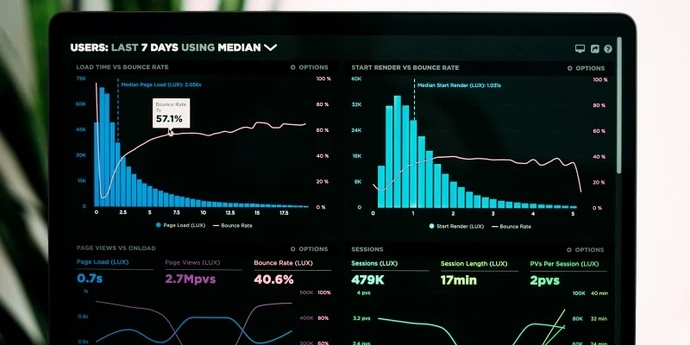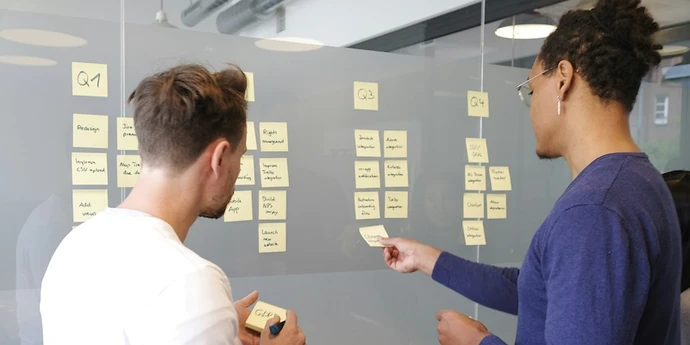If you're reading this, then you're probably interested in becoming an Associate Product Manager (APM) or an APM intern at Google. Well, you're not alone.
There is a lot of competition for a limited number of open positions (50 full-time positions each year at the time of writing). So if you want to get one of those offers, you'll need to know how to nail your Google APM interviews.
But here's the good news for you: a lot of people don't put in the work to properly prepare for their interviews. So, if you focus on the right kind of preparation, and put in the time to practice for your APM interviews, then you'll have a leg up on the competition.
In this guide, we'll cover everything you need to know to prepare for your Google APM interviews. We'll begin with a quick overview of Google's APM program. Then we'll cover the interview process, some example questions, and tips for your preparation.
However, if you want to go to any particular topic now, simply click on the links below.
Click here to practice with 1-to-1 with Google ex-interviewers
1. Google APM program overview ↑
The Google Associate Product Manager (APM) program is a full-time job in a two-year rotational program. It is intended for candidates who just graduated or who are at an early stage in their careers (e.g., 1-2 years of work experience).
It's highly competitive but is a great way to get into product management right at the top of the industry.
Google also has an APM internship program, which is similar in some ways to the full-time APM program. The internship program is for a 13-week period between May and October of a given year, typically for junior students who will be entering their final year of college.
Although the rest of this article is primarily focused on the full-time rotational APM program, much of the information here will still be helpful for those interested in the internship.
1.1 Why Google created the APM program ↑
The APM program aims to develop Google's next generation of product leaders who will lead Google's efforts across design, engineering, marketing, and beyond to launch impactful projects.
It provides opportunities for new recruits to gain exposure to a variety of technologies and to learn how those technologies are used in different industries and geographic locations.
When Marissa Mayer first became a product manager at Google, she and other senior leaders realized that Google's engineering-driven culture needed PMs who could creatively and effectively collaborate with engineers, designers, and people in other functions to determine what teams should do next.
They also needed recruits who could ably work within the company's consensual power culture. The experienced product managers they hired from other tech companies were used to top-down power structures, and they didn't fit in well at Google.
So in 2002, the Google APM program was born—an elite training program for recruiting fresh talent into Google's ranks. Meyer started and ran the program herself, including the international trip aspect, which she personally led.
Google APM program applications are accepted around fall of every year for screening and hiring for the following year. Successful candidates make up a cohort for that year.
1.2 APM program perks ↑
The APM program at Google is a great opportunity to break into both Google and the product management field. The Google APM program is quite prestigious, with former Google CEO Eric Schmidt even saying that someone from the APM program may become the new CEO of Google one day.
In addition to the reputation and exposure that the APM program offers, there are also some unique benefits that may not be available in other entry-level PM roles:
- Mentorship
- APM members get an APM buddy who is a year ahead of them.
- APM members have access to management coaches from outside Google.
- APM Trips
- Each APM cohort gets to take a 2-week trip to different cities around the world to visit international Google offices and learn about how technologies are used in different places/industries.
- APM cohorts also get to take "mini trips" to different cities within the US to learn more about industries or businesses of interest.
- Community
- The APM cohorts jointly participate in many program events, such as skill-building classes facilitated by Google PMs and industry experts, volunteering events, and APM offsites.
- APM cohorts can grow into tight-knit communities that remain connected for years after their initial meeting in the program.
In addition to these benefits, it's also worth mentioning that APMs at Google are compensated generously. Based on Glassdoor data, the average base salary for Google APMs is about $146K/year, with average total compensation at $166K/year.
Now that we've covered an overview of the APM program, let's turn our focus to the rigorous APM interview process, so you can learn what it takes to land one of these jobs!
2. Interview process and format ↑
In this section, we'll walk through a high-level overview of the typical stages you'll face during Google's interview process for the APM role. Once you have an idea of the sequence (and number) of interviews you'll face, then we'll dig into the typical interview format.
Let's get started!
2.1 Interview process ↑
The typical interview process for a Google APM role is roughly as follows:
- Resume / cover letter application
- Phone screen (1 interview)
- Onsite interviews (3-5 interviews)
- Final interview with an executive
As mentioned above, Google only recruits a small group of APMs each year, so to get an interview, you'll need your resume to really stand out. Use our free comprehensive guide on how to write a resume for Google (with six examples from successful Google candidates).
To go one step further and really increase your chances, get expert feedback on your resume. Click here for a resume review with a Google ex-interviewer or recruiter.
Once you get past the resume screening, you'll usually have your first interview over the phone before Google decides if they want to bring you in for the onsite interviews.
The onsite interviews are held at a Google office (often the Mountain View or New York offices). During this busy day, you'll have 3 to 5 interviews, in which you'll be expected to answer a variety of product management interview questions.
Throughout the process, interviewers will be evaluating you based on four key criteria (role-related knowledge, general cognitive ability, leadership, and Googleyness).
If all goes well, then your final step is an interview with an executive from the APM program. Historically, this has been a 1-on-1 meeting with Brian Rakowski (APM Program Lead). If you are successful at each of these stages, then you'll receive an offer!
Now, let's spend some time digging deeper into the format of an individual interview.
2.2 Interview format ↑
Google has published a really insightful video, led by two current Google Product Managers, on APM interview preparation. This video is a few years old but still very relevant. It covers several topics, but we think it's particularly helpful for gaining an understanding of the flow of an APM interview.
It's a fairly long video (~30 minutes), and so we've summarized some of the key points for you below, particularly around the format of APM interviews.
In the video, they explain that a Google APM interview includes 3 main parts:
Part 1: Warm-up
The warm-up at the beginning of an APM interview is more of a casual conversation starter. But you'll definitely want to be prepared for this portion of the interview because it will help you make a good first impression.
Warm-up questions would be something like "Why Google?", or "Tell me about yourself". Your interviewer will typically expect you to give a brief (~1-2 minute) answer to this type of question.
Part 2: Product management questions
Once you've finished the warm-up, your interviewer will begin to ask you product management interview questions, to assess you on areas like product design, strategy, and technical skills.
This stage of the interview will take up the bulk of the interview time. The example question they give in the video above is, "How would you design a smartwatch for a child?"
Your interviewer will typically expect you to give a more in-depth (~5-10 minute) answer to this type of question. You can find more example questions in the next section of this article.
Part 3: Your questions
Finally, your interviewer will usually provide some time at the end of your interview for your questions. You should prepare a few in advance, in order to gain insight and make a good impression.
This is a great opportunity for you to demonstrate that you've done your homework and that you're excited about the type of work you'd be involved in as an APM.
3. Example Google APM interview questions ↑
The types of questions that you'll encounter in one of Google's APM interviews are similar to the types of questions that are asked in Google's regular Product Manager interviews.
We've previously analyzed the questions asked in Google's PM interviews using data from Glassdoor.com, and we've organized these questions into six buckets. You'll find an overview of these six question types below:

Let's step through each type of question, take a look at a few examples, and briefly discuss why Google asks these questions.
3.1 Design questions ↑
One of a product manager's core tasks is to help design new product features and improve existing ones.
Product design questions assess your customer empathy, creativity, and your ability to use a structured approach to design products. Below are a few examples of design questions asked in Google PM interviews.
For more information, check out our articles on how to answer product design questions, product improvement questions, and favorite product questions in PM interviews.
Example design questions
- What's your favorite product and why?
- Design a theme park app.
- How would you improve Google Chrome?
- How would you design X product for Y people? (e.g. a phone for hard-of-hearing people)
3.2 Strategy questions ↑
PMs are also responsible for setting the product vision and the roadmap to deliver it. In other words, they're in charge of product strategy.
Strategy questions assess your ability to analyze the wide range of factors that PMs need to consider when making product decisions. This includes competition, pricing, marketing, time to market, etc.
Below we've listed a few examples of strategy questions. You can also learn more in our article on how to answer strategy interview questions.
Example strategy questions
- Imagine you're CEO at Uber. What would your 10-year strategy be?
- How would you solve homelessness in downtown San Francisco?
- Why does Starbucks sometimes have coffee shops on both sides of the road?
- Google has invented a technology that makes air travel 4x cheaper and 4x faster. What do you do with it?
- You are the CEO of company X. What new products would you launch and why?
- Tell me about a competitive move by a company in the past six months and what you think about it.
3.3 Estimation questions ↑
Making product decisions often requires estimating market sizes, revenue potential, number of customers, etc. Estimation questions test your ability to work with numbers and to break down problems.
In estimation questions, interviewers don't care so much about whether you get to the right number or not. What they are really interested in is how you think through the problem and how comfortable you are making assumptions and simple calculations.
Below are a few examples of estimation questions asked in Google's PM interviews. For more information, check our article on how to answer estimation questions in PM interviews.
Example estimation questions
- Estimate the time spent at stoplights each year.
- How much money is spent on gas in the US every year?
- What is the market size for driverless cars in 2025?
- How much storage space is required for all the images in Google Street View?
- How much does it cost to run YouTube for a day? How much revenue does it make in a day?
- What Internet bandwidth is required for an average US college campus?
3.4 Behavioral questions ↑
As in most interview processes, you'll also need to answer behavioral interview questions. These questions tend to fall into three categories:
- Your motivation to work at Google and as a PM
- Your past experiences, mainly around managing conflict and working with a diverse group of stakeholders
- Your understanding of what good PMs do and don't do
These questions aren't particularly hard compared to some of the other ones we are listing in this article and are sometimes overlooked by candidates. So, it's worth spending some time to prepare answers for them to build a small edge against other applicants.
Christian, a former Google Manager and interviewer, emphasizes that the company also looks for "Googleyness," or cultural fit. Google wants to make sure that the company is the right environment for you, as it also assesses your fitness for Google's culture. "These questions often focus on how you would react to certain situations, based on your values and attitudes," says Christian.
To demonstrate Googleyness in your answers, tell stories about how you:
- Are comfortable with ambiguity
- Show humility and value feedback
- Have a bias for action
- Do the right thing
- Take ownership
- Have high standards and dream big
- Think freely
- Enjoy having fun
For more information, check out our articles on how to answer behavioral interview questions and the "Why Google?" question, as well as on what Googleyness is and how to demonstrate it.
Example behavioral questions
- Tell me about yourself.
- Why do you want to work at Google?
- Why this PM position (or why APM)?
- Tell me about a time you demonstrated leadership.
- Tell me about a time you solved a difficult team conflict.
- Tell me about a time you cracked a tough problem.
- What's a good PM?
- A colleague is struggling with a task, but you're very busy. What do you do?
3.5 Technical questions ↑
Google was founded by PhD students and has retained a tradition of hiring particularly technical candidates. This applies to product management too, and Google PMs tend to be more technical than average.
As a result, as an aspiring APM, you'll likely need to answer technical questions during the interview process. As you can see below, these questions often don't include coding. They are centered on whether or not you understand certain technical concepts and can explain them simply.
For more information, check out our article on how to answer technical interview questions.
Example technical questions
- How does Calendar work?
- Explain the concept of "protocol" to a four-year-old child using an "ice cream store" as an analogy
- Explain the concept of "recursion" to my grandma
- Describe a typical page load time distribution on a desktop device. What about on mobile?
- Design a simple load balancer for Google.com. What data structures would you use?
- How would you write an algorithm to do X?
3.6 Data analysis questions ↑
Finally, each Google product has a set of hero and secondary metrics that are used by PMs to assess if the product is successful and to decide what their team should work on next.
So, during your interviews, you may face questions about what metrics you would track for a given situation, or how you would investigate the changes in a given metric.
For more information, check out our article on how to answer metric interview questions.
Example data analysis questions
- Imagine you're a PM of YouTube Analytics. What are your three key metrics?
- How would you measure the success of Apple's WWDC event?
- What are things Netflix should measure and analyze on a daily basis?
- YouTube traffic went down 5% yesterday. How would you report this issue to Sundar Pichai?
- You are the PM for YouTube analytics. What are your three most important metrics?
- You launch a newsfeed algorithm for Facebook and the average time per session goes down by 20%. What do you do?
4. Preparation tips ↑
Now that you know what questions to expect, let's focus on preparation.
Below, you’ll find links to free resources and five introductory steps to help you prepare for your Google APM interviews.
4.1 Deep dive into the product / organization↑
As you've probably figured out from the example questions listed above, it's important to be familiar with Google's products and its organization. You'll therefore need to do some homework before your interviews.
Here are some resources to help you get started:
- Alphabet annual reports and strategy presentations (by Alphabet)
- Google strategy teardown (by CB Insights)
- Google org culture analysis (by Panmore Institute)
- Life at Google (Inside Google blog)
4.2 Brush up on product fundamentals ↑
If you're applying to Google's APM program, then you're likely new to the product management field. If you want to dwell, it's worth spending some time familiarizing yourself with basic product management concepts.
Here is a list of free resources to give you a starting point:
- Popular PM interview books reviewed (by IGotAnOffer)
- Product Management Guides (by Aha.io)
- Product vs. Feature Teams (by Silicon Valley Product Group)
- What distinguishes the top 1% of product managers from the top 10%? (by Ian McAllister on Quora)
- What's something product managers know that others don't? (by Dan Schmidt on Quora)
- Product Requirements Document Example (by Product Hunt)
- Data-Driven Product Management: Choosing the Right Metrics for Your Product (by productcoalition.com)
- How Should Product Managers Say No? (by productcoalition.com)
4.3 Learn a consistent method for answering PM interview questions ↑
As mentioned previously, Google will ask you questions that fall into certain categories like behavioral, design, strategy, estimation, and metric questions.
Approaching each question with a predefined method will enable you to build strong interview habits. Then, when it comes time for your interviews, these habits will reduce your stress and help you to make a great impression.
If you’re just looking for a jumping-off point, you can start learning about the different question types you’ll need to master in the following blog articles:
- Product design questions
- Product improvement questions
- Favorite product questions
- Strategy questions
- Estimation questions
- Behavioral questions
- Technical questions
- Metric questions
- Prioritization questions
Once you’re in command of the subject matter, you’ll want to practice answering questions. But by yourself, you can’t simulate thinking on your feet or the pressure of performing in front of a stranger. Plus, there are no unexpected follow-up questions and no feedback.
That’s why many candidates try to practice with friends or peers.
4.4 Practice with peers
If you have friends or peers who can do mock interviews with you, that's an option worth trying. It’s free, but be warned, you may come up against the following problems:
- It’s hard to know if the feedback you get is accurate
- They’re unlikely to have insider knowledge of interviews at your target company
- On peer platforms, people often waste your time by not showing up
For those reasons, many candidates skip peer mock interviews and go straight to mock interviews with an expert.
4.5 Practice with experienced PM interviewers
In our experience, practicing real interviews with experts who can give you company-specific feedback makes a huge difference.
Find a Google product manager interview coach so you can:
- Test yourself under real interview conditions
- Get accurate feedback from a real expert
- Build your confidence
- Get company-specific insights
- Learn how to tell the right stories, better.
- Save time by focusing your preparation
Landing a job at a big tech company often results in a $50,000 per year or more increase in total compensation. In our experience, three or four coaching sessions worth ~$500 make a significant difference in your ability to land the job. That’s an ROI of 100x!















